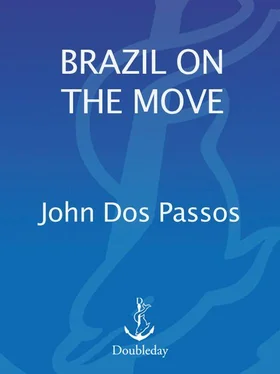Juscelino Kubitschek had been busy rebuilding his old coalition between Goulart’s party and his Social Democrats. His aim was seemingly to strengthen the right wing of the Labor Party and to wean the President away from Brizola and the Communist apparatus. Now he had to go flying to Brasília to apply the healing oil. He had already come out for a return of full powers to the presidency. Why not? He was planning to be President again himself. He could appeal with some authority to João Goulart not to let the situation get out of hand.
Not long after, in a reshuffling of the Cabinet to bring it more in line with Goulart’s ambitions, Brochado da Rocha was forced out. He went home to his state capital at Pôrto Alegre and a few days later was taken with a cerebral hemorrhage and went to bed and died.
The Communist-inspired press attacked Lacerda as a murderer. He was a Lucifer of reaction. He was plotting with American imperialists. Subsidized by American funds he had again brought about the death of an eminent Brazilian statesman. Vargas dead, Quadros ruined, and now Brochado da Rocha. The nation must be rid of this sinister influence.
In spite of the clamor the elections passed off in peace and quiet on October 7. Just before election day Lacerda obtained a two months’ leave of absence from his legislature to go to Europe to study European subway systems. If he could start the construction of a subway while his governorship lasted he would have accomplished one more benefit for his “marvelous city.” Already he could point out that the rate of new industrial investment in Guanabara had for the first time surpassed the rate in São Paulo.
The governor needed a rest indeed. Weeks and weeks of working eighteen hours a day had broken down even his robust health. The cold which had troubled him for weeks went to the brink of pneumonia before his doctor put him to bed. Candidates friendly to his policies had to finish their campaigns with little help from their leader.
The election returns, like those in similar elections held in the United States a month later, could be interpreted almost any way you wanted them. Communist-supported candidates won and anti-Communists won. The commentators however did point out that for Brazil it was a democratic victory. The forms of democracy were rigorously observed. There was no violence or intimidation at the polls and even very little talk of corruption. The turnout was large.
On account of the proportional system of representation it took a very long time to count the votes. The number of candidates for office was everywhere staggering. This meant a scattering of the independent vote which was an advantage to politicians with wellorganized machines.
In Guanabara, Lacerda’s enemy Brizola was elected deputy by the largest vote on record. Anti-Americanism paid off. Lacerda’s friends carried the state legislature but lost the vice governorship, which would mean difficulties for the governor during the rest of his term. The Alliance for Progress proved a liability.
In Pernambuco, the northeastern state where such efforts had been made by the Catholic Church and by influences from the United States to undercut the Communist peasant leagues, Miguel Arraes, the Communist-supported candidate won the governorship by a small margin. His campaign was largely financed by Brazil’s second richest man, a manufacturer from São Paulo named Ermírio de Moraes. Moraes himself, who took the precaution of hiring every taxicab in the state capital of Recife to carry his voters to the polls on election day, went to the federal senate. These developments were a severe blow to Washington’s hopes for an Alliance for Progress in Brazil.
However, in the key state of São Paulo the story was entirely different. Jânio Quadros tried for a political comeback and was defeated by his old enemy Adhemar de Barros, whose campaign was frankly directed against Communist and Castro influences. In President Goulart’s own state of Rio Grande do Sul the voters made a clean sweep of his brotherinlaw Brizola’s supporters. Menighetti, a conservative who had opposed Brizola’s seizure of the American public utilities, was elected by a large majority. When news came of Brizola’s election to the Chamber from Guanabara streamers appeared across the streets of Pôrto Alegre reading THANK YOU CARIO-CAS.
The Unhão Nacional Democratico came out badly. For a while it looked as if the chief beneficiary of the 1962 elections might be Juscelino Kubitschek, who wasn’t running for any office at all. Certainly his position was improved as a contender for presidential nomination by the Social Democrats in 1965, but at the same time the figure of the present governor of Minas Gerais, Magelhães Pinto, began to loom as presidential timber. It is too early to say whether Lacerda has lost political prestige. This isn’t his first political reverse. Growing enthusiasm for his presidential candidacy in 1965 is reported from São Paulo. At fortyeight he is just reaching political maturity. His is the most compelling presence on Brazilian television. He somehow finds words every voter can understand to explain the difference between the reorganization of society under freedom and the Communist or Castro way. The direct approach, the straight talk, the burning dedication of the dark eyes behind the shellrimmed glasses still hold his audiences spellbound.
Friends tell you laughingly about his European “vacation.” Not an idle moment. In Paris he spent his time negotiating a deal with a French concern to install a subway in Rio which is to be financed largely by French funds. In West Germany he contracted for a hospital. He is not known to have done any work during the week he spent in Sicily. On the steamboat back from Italy he whiled away his time preparing a volume of his speeches for publication, and translating a Broadway play, Come Blow Your Horn , which he had found amusing one night in New York, from English into Portuguese for production in Rio.
VIII
THE UNEASY NORTHEAST
( meditations out of a traveler’s notebook )
Boa Viajem, Recife, September 13, 1962
The name of the beach means “pleasant journey.” It brings up a picture of people riding out from the city in the old days to wave to their friends tacking out from the harbor entrance on sailing ships into the onshore breeze. I don’t find the hotel as pleasant as it seemed when I was there with my wife and daughter four years ago; rebuilt and modernized, it lacks the rustic air it had. Maybe it’s that my family has gone back to the States. There’s been an immense amount of building. The beach has taken on a standardized resort look.
The fishermen have been chased away. Watching their jangadas was one of the real pleasures of our stay in Recife four years ago.
The jangada is a boatshaped raft made of logs of various light woods. The fishermen push them out in the morning over the heavy surf. Using a lateentype sail they cruise far out into the ocean. They fish with casting nets and hook and line. They steer with a paddle and with moveable leeboards pushed down between the logs, like on the Kon-Tiki . They are awash most of the time. We never did get to go out on one but it was a constant pleasure to follow their skillful navigation, tacking back and forth into the wind; and then the return in the afternoon running before the wind through gaps in the black reef that gave its name to this capital city of the ancient sugar state of Pernambuco, and back through the surf onto the beach.
The fishermen stored their gear in neatly made shelters of plaited palmleaves, up under the endlessly swaying rustling coconut palms. The catches they brought ashore in their deep baskets seemed pathetically small. These waters are not rich in fish.
Читать дальше












